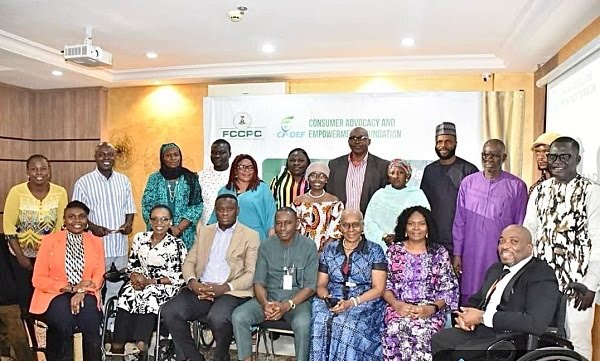The Federal Competition and Consumer Protection Commission (FCCPC) has reiterated its commitment to safeguarding the rights of Nigerians, with a special focus on Persons with Disabilities (PWDs). At a high-level policy roundtable on financial inclusion for PWDs held in Abuja, the FCCPC emphasized its ongoing efforts to ensure accessible, inclusive services across sectors for all citizens. The roundtable was organized by the Consumer Advocacy and Empowerment Foundation (CADEF), drawing together key stakeholders to address the pressing challenges faced by PWDs in accessing digital and financial services.
Speaking at the event, FCCPC’s Deputy Director of Consumer and Business Education, Nwafor Anthony, highlighted the commission’s strategic initiatives aimed at promoting inclusivity and eradicating discriminatory practices against persons with special needs. “The FCCPC is committed to creating an environment where all Nigerians, especially those with disabilities, can access essential services without facing barriers,” Anthony stated. He went on to describe how the commission has launched campaigns to raise awareness and ensure that financial service providers, as well as other industries, recognize and act upon their responsibility to offer accessible, equitable services to PWDs.
The event also underscored the proactive role of the Central Bank of Nigeria (CBN) in championing inclusive financial policies. Jamiu Rabiu, Assistant Director of the CBN’s Consumer Protection Department, shared the apex bank’s initiatives aimed at integrating PWDs into Nigeria’s financial ecosystem. “Financial inclusion is not just a buzzword; it’s an imperative,” Rabiu said. He outlined how the CBN has been working with financial institutions to enhance digital services and adopt regulatory frameworks that prioritize the needs of PWDs, whether they live in urban centers or remote rural areas. Rabiu added that the CBN is enforcing policies that compel financial institutions to ensure their digital platforms are accessible to all Nigerians, recognizing the unique challenges that PWDs face.
Professor Chiso Ndukwe-Okafor, Executive Director of CADEF, emphasized the urgency of addressing the obstacles PWDs face in accessing financial services. In her opening remarks, Ndukwe-Okafor stated that the policy roundtable was a critical forum for identifying both challenges and solutions to the digital barriers faced by PWDs. “The difficulties that PWDs encounter, both online and offline, are often overlooked. Today’s gathering is about recognizing those challenges and developing actionable strategies to dismantle them,” she remarked. The professor noted that inadequate infrastructure and a lack of effective policy frameworks have historically excluded PWDs from the financial sector, making everyday transactions difficult and, at times, impossible.
According to Ndukwe-Okafor, the insights and recommendations arising from this roundtable are intended to establish a comprehensive framework that will serve as a guideline for future efforts to enhance financial inclusion for PWDs. “We want to see measurable change,” she affirmed. “This framework will support advocacy, policy development, and collaboration among stakeholders to ensure that no one is left behind in Nigeria’s growing digital economy.”
A diverse mix of organizations attended the event, underscoring a wide-reaching commitment to financial inclusion for PWDs. Among them were representatives from the National Commission for Persons with Disabilities, the Association of Nigeria, various disability rights groups, and online financial institutions. Together, these entities lent their voices and expertise to the roundtable’s discussions, sharing insights on how policy, technology, and education can converge to make Nigeria’s financial services more accessible.
The discussions highlighted the need for accessible infrastructure across financial platforms and services, as well as policy reforms that not only mandate but also incentivize financial institutions to cater to the needs of PWDs. Additionally, participants examined how accessible digital platforms, improved customer support for PWDs, and specialized training for staff could significantly enhance the overall experience of PWDs in financial transactions.
In her closing remarks, Ndukwe-Okafor reiterated the importance of a united approach, calling on policymakers, financial institutions, and advocacy groups to recognize that achieving financial inclusion for PWDs is integral to Nigeria’s economic and social growth. “We have a moral and civic duty to ensure that all Nigerians, regardless of ability, have equal access to the resources they need to thrive,” she asserted.
The FCCPC, CBN, and other participants expressed their shared commitment to advancing the rights of PWDs by working collaboratively to eliminate barriers in the financial sector. They agreed that the time is now to establish a Nigeria where financial inclusion is not just a vision but a reality for everyone, including Persons with Disabilities.


